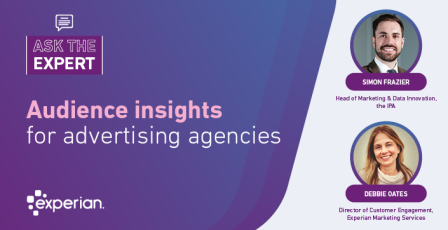How supporter data can create a connected donor experience
How much information do you know about your supporters?
Typically, you’ll know some basic contact details for those who’ve donated to you in the past (unless you outsource your fundraising process through a third party giving platform). You may know further information, such as their address but may not know if they are repeat donors.
What else do you know? Do you know other pieces of demographic information such as their age, gender and life stage? Do you know much about their type of dwelling, how long they’ve lived there and their propensity to move? Do you know any of their financial attributes or habits?
These types of insights help you build a detailed picture of your top supporters and target audiences, so you can tailor their interactions and experience with you. In this article we explore the types of donor insights available and how they can impact your donor experience and fundraising performance.
Data quality is more important than ever in an evolving digital world
The relevance of content served by a charity to its intended audience – and the ultimate return of that investment – is heavily influenced by the quality of data it collects from its users. Supporter experience architects can only make their magic work when the data baseline is clean and trusted, especially in a new era of hyper-personalised content that can be made relevant to the user’s location and medium (smartphone or tablet). Getting it wrong could be worse than not personalising at all (but more on that later). From a practical perspective, that means we rely on having access to data sets that have been cleansed and condensed which can then be enriched with donor insight data to optimise their value and inform donor experience programmes.
What are the main types of donor insight data?
Here is a snapshot look at the different types of data points available today:
- Demographic data is the output from analysis of population-based insights such as life stage and gender. By understanding the socio-economic make-up of your donor database, you can begin to identify where donors with similar demographic traits exist and tailor your fundraising strategy to them.
- Geographic data, also known as geodata or geospatial data, refers to any supporter data point that is intrinsically linked to a physical location. For example, understanding where your current donor database live may help you identify more supporters in a similar region or location, where you can then focus fundraising efforts.
- Location data such as an address, or information regarding a property type provides valuable information to organisations. Knowing the number of rooms, or whether a building is an apartment, or a house, can help you understand your donors better.
- Financial data insights, such as income & repayment indicators can be used to hone your messaging towards certain donors.
- Behavioural data consists of those data points that provide insights into what donors like to do and how they donate or volunteer. You can also identify who uses your services or supports your charity by volunteering. Could they become a donor?
By combining the above data assets you can start to build a very insightful picture of both your current donor base and key prospects to target for future fundraising campaigns and to inform what your wider donor experience should look like.
Get more value from your fundraising spend
At Experian, we empower organisations to better understand their data assets and transform their business. Our solutions are developed with data users and practitioners in mind, focusing on usability, automation, transparency, and accuracy.
With our advanced donor profiling platform, Mosaic, together with our wealth of UK donor data, we can help you to understand, locate, and target your ideal supporters more effectively – and personalise messaging for them. You can use this data to build donor profiles with impact and deliver higher returns on your fundraising spend.
Successful profiling can only be achieved with an accurate starting point for your data. Implement real-time, built-in checks with Data Validation solutions at multiple data points to ensure potential donors or volunteers really are who they say they are, and that their details are captured accurately; without impacting the supporter journey. From this starting point, you have the building blocks for more effective profiling, targeting and segmentation of your supporters to help maximise your interactions and engagements with them.
How can we help?
With the cost of living crisis ongoing, we recognise that many nonprofit organisations are concerned about how they will be able to meet the growing demand for their services against a backdrop of increased operating costs, salary constraints, and stretched resources.
This is where data validation and enrichment can help, by allowing you to optimise your fundraising efforts through a greater understanding of donors to drive confident marketing decisions, impactful campaigns and a strong ROI.
When you leverage supporter data thoughtfully, you can create a connected donor experience:
- Develop relationships with donors
- Donor retention
- Prove your charity impact
Get in touch
Are you looking to modernise your supporter experience? Speak with an expert today.
Get in touch







